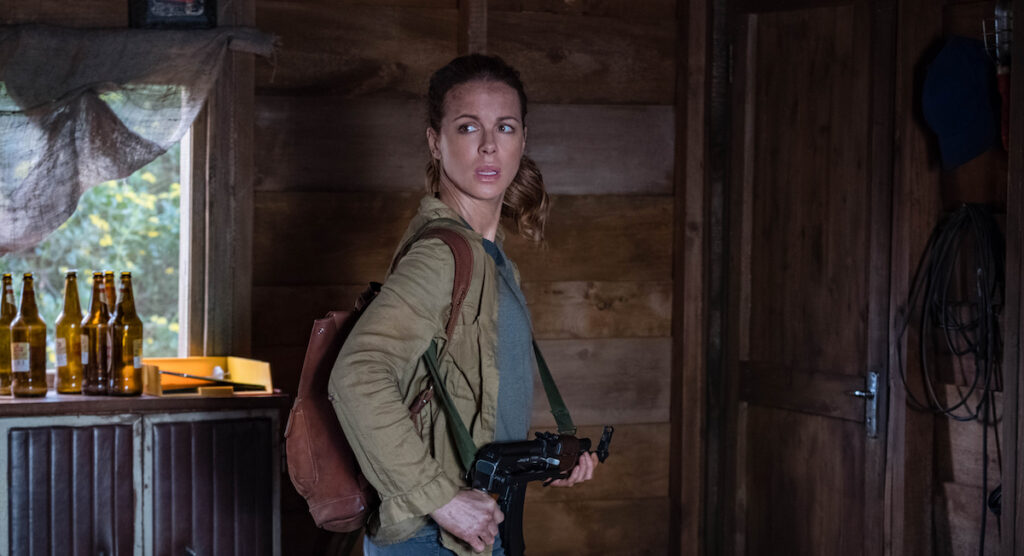Grief, conventional wisdom tells us, looks the same on everyone. We deny, we weep, we rage, we bargain. Eventually, we come through, our memories still painful, but somehow sweet, too. The reality is something else entirely. We run from guilt and trauma, and seek answers that can only hurt us, never stopping to ask why. We do it all out of order, messily wading through a storm of loss and bureaucracy and social situations and emptiness and fear and on, and on, and on. And if we’re a Kate Beckinsale character in an Amazon Prime thriller series, we see a man in an orange ballcap on the news and know instantly that it’s our dead husband.
“The Widow,” the series in question from writers Harry and Jack Williams (“Rellik”), doesn’t waste its time in trying to convince you that the man in the orange cap is or is not Will Mason (Matthew Le Nevez). Georgia Wells (Beckinsale) believes it, and almost no one believes her. (This is a thriller—the template should feel pretty familiar.) Darting back and forth between her past and the chaotic present (with the help of a truly dizzying number of title cards), the series fills us in on the circumstances of the plane crash that apparently took Will’s life, the sometimes lovely, sometimes difficult years leading up to that nightmare, and the endless obstacles Georgia encounters as she begins what seems like a hopeless search for answers in the Democratic Republic of Congo.
Gradually, the camera pulls back, introducing us to those tied, directly or indirectly, to the crash: a blind man (Ólafur Darri Ólafsson) hoping to be accepted for a miraculous surgery; Will’s boss (Alex Kingston of “Doctor Who” and “E.R.”), whose impatience with Georgia says more about her own tragic past than it does about Georgia’s search, a young girl (Shalom Nyandiko) serving as a child soldier and trying to help another child survive; the list goes on. Each of these characters and their stories can be compelling. Georgia’s story can, too—particularly because Beckinsale, often underrated, does thoughtful, subtle work throughout. But sometimes even the most compelling bits can be hard to spot in the series’ wash of sameness.

With few exceptions, even the most boilerplate “thriller” sequences move at the same pace as the moments of character-building or emotional exposition, and that pace could be generously described as leisurely. There’s little that might compel you to hold your breath or swell with dread. Frankly, there’s little to indicate where you are in an episode or in the season. The endings are clear, because endings mostly mean cliffhangers, but beyond that, it’s a bit of a wash. That sameness—the limp structure, the disinterest in pacing and atmosphere, the steady feed of backstory and clues that all carry the same weight—makes it damn hard to follow, even when you’re invested. Hell, I watched several episodes multiple times, and am equally convinced that the character the great Charles Dance plays is Georgia’s father-in-law, her mentor, and her uncle. Maybe all three?
<span class="s1" That’s what makes the many location and episode title cards, though irritating, a necessity. It all feels the same, and somehow looks the same, even when the colors and textures change dramatically. Sure, we see similar establishing shots in Denmark, and yes, we get accustomed to seeing Joyce’s (Kingson) front gates, but let your attention wander for more than a moment and you’re likely to get a bit lost.
There’s an admirable bluntness to how the show approaches death, violence, heartbreak, cowardice, and corruption. It’s not as though “The Widow” lacks compassion, and it certainly doesn’t revel in brutality. Instead, Williams and Williams force the viewer to accept that what Georgia is doing is dangerous, that the world is cruel, that people are going to die, and that other people, whether active or complicit in the killing, are responsible. “The Widow” is as willing as, say, “Game of Thrones” to kill its darlings, but does so with far less pomp and circumstance. Things blow up. People get shot. No one, save the woman with her face all over the posters, is safe for long. But it’s not intended to capital-S Shock. It just happens, without ceremony.

It’s an approach mirrored in the performances, particularly Beckinsale’s. It’s worth noting that this series, the majority of which takes place in the D.R.C., doesn’t have all that much time to spare for its African characters, save the villainous General (Babs Olusanmokun) being driven mad by guilt (the rare instance of the sameness being broken, as we step inside his head from time to time) and the little girl, Adidja (Nyandiko), whose story goes exactly where you think it’s going to go after she crosses paths with one of the main characters. Still, even the most underdeveloped characters fare reasonably well, because the cast is uniformly good, and Beckinsale is the kind of actor who can make listening or standing in silence a vital, compelling act. She’s subtle enough to make the clichés more palatable, dynamic enough to add emotional vitality to even the most flat piece of exposition, and thoughtful enough to bring it all back to this idea of grief—in nearly every scene, she gives the impression of a person who’s long been holding her breath. Whenever she even slightly releases it, this ostensible thriller becomes actually thrilling.












